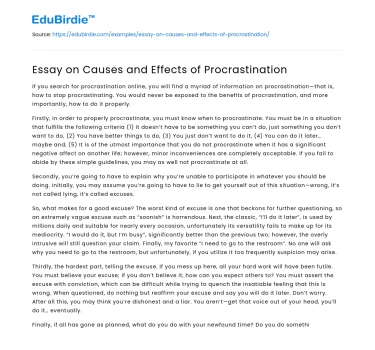If you search for procrastination online, you will find a myriad of information on procrastination—that is, how to stop procrastinating. You would never be exposed to the benefits of procrastination, and more importantly, how to do it properly.
Firstly, in order to properly procrastinate, you must know when to procrastinate. You must be in a situation that fulfills the following criteria (1) It doesn’t have to be something you can’t do, just something you don’t want to do, (2) You have better things to do, (3) You just don’t want to do it, (4) You can do it later… maybe and, (5) It is of the utmost importance that you do not procrastinate when it has a significant negative affect on another life; however, minor inconveniences are completely acceptable. If you fail to abide by these simple guidelines, you may as well not procrastinate at all.
Save your time!
We can take care of your essay
- Proper editing and formatting
- Free revision, title page, and bibliography
- Flexible prices and money-back guarantee
Secondly, you’re going to have to explain why you’re unable to participate in whatever you should be doing. Initially, you may assume you’re going to have to lie to get yourself out of this situation—wrong, it’s not called lying, it’s called excuses.
So, what makes for a good excuse? The worst kind of excuse is one that beckons for further questioning, so an extremely vague excuse such as “soonish” is horrendous. Next, the classic, “I’ll do it later”, is used by millions daily and suitable for nearly every occasion, unfortunately its versatility fails to make up for its mediocrity. “I would do it, but I’m busy”, significantly better than the previous two; however, the overly intrusive will still question your claim. Finally, my favorite “I need to go to the restroom”. No one will ask why you need to go to the restroom, but unfortunately, if you utilize it too frequently suspicion may arise.
Thirdly, the hardest part, telling the excuse. If you mess up here, all your hard work will have been futile. You must believe your excuse; if you don’t believe it, how can you expect others to? You must assert the excuse with conviction, which can be difficult while trying to quench the insatiable feeling that this is wrong. When questioned, do nothing but reaffirm your excuse and say you will do it later. Don’t worry. After all this, you may think you’re dishonest and a liar. You aren’t—get that voice out of your head, you’ll do it… eventually.
Finally, if all has gone as planned, what do you do with your newfound time? Do you do something productive or relaxing
Procrastination isn’t bad if you’re doing something productive. Right?






 Stuck on your essay?
Stuck on your essay?

